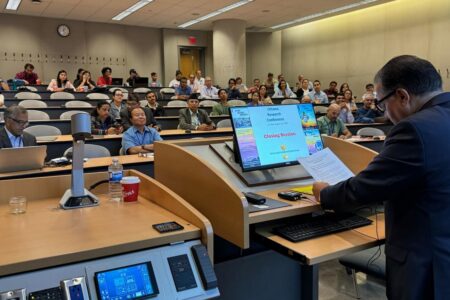Kathmandu, A two-day academic conference has been completed in Ottawa, Canada. More than 100 scholars from America, UK, Canada and Nepal participated in the two-day academic conference jointly organized by the Nepali community of Ottawa and the Nepali Student Organization of Ottawa University at the University of Ottawa.
In the conference, retired professor of New Brunswick University, Basu Sharma, gave an interesting presentation on the difficulties encountered in negotiating between different cultures and how to solve them.
Likewise, Ramesh Shrestha, a scholar who has worked at the United Nations, complained that although researchers have been warning about climate change, pollution, food crisis and environmental crisis for the past 50 years, world leaders have not taken effective steps to solve those problems. Dr. Ajay Bist, who works in Natural Resources Canada, said that local municipalities should take the lead in dealing with the climate change problem.
Ram Acharya, an economist associated with the Institute for Nepal’s Prosperity, said that although remittances have supported Nepal’s economy, the growing trade deficit has exposed the crisis of the Nepali economy.
Deportation has made the country more weak and structurally weaker, Acharya said, adding that the idea of leaving the country by any means is killing entrepreneurship, innovation and hope in the country.
He said that till 2015 Nepal’s remittances were the total import of rice, but after 2015, the country has reached a situation where it has to look for loans and import. He suggested to move forward with a new energy and thinking to solve this problem.
At the conference, Dr. Rachna Devkota, working in Statistics Canada, discussed the use of agricultural machinery in the mountainous terrain of Nepal, Radhika Aryal, a senior nurse working at St. Michael’s Hospital in Ontario, gave a guide on the use of cannabis in Canada, and Dr. working in the Canadian Department of Health. Gobind Dahal gave a presentation on the social indicators of health in Nepal.
Similarly, Dr. Bhanubhakta Acharya, professor of journalism at Ottawa University, said that in most Canadian universities, the use of Artificial Intelligence (AI)-based artificial assistants such as ‘Chat GPT’ has been banned, but chatbots such as ‘Edit GPT’ have been allowed to be used.
Journalist Bhagirath Yogi gave a presentation on the commerciality and sustainability of Nepali online portals operated in the diaspora and journalist Jairam Gautam presented about the role of the online magazine ‘Nepal Touch’ to inform the Nepalese community in Canada.
Addressing the closing ceremony, the Nepali Ambassador to Canada Bharatraj Paudyal said that Canada is an important development partner of Nepal. Ambassador Paudyal said that Nepal and Canada have a friendly, trust-based and the best bilateral relationship that can be between any two countries.
Ambassador Paudyal said that the implementation of the non-residential Nepalese citizenship mentioned in the Constitution of Nepal has been completed and the Nepalese government has amended the Nepalese Citizenship Act and Regulations. “The government is committed to provide social, cultural and economic rights to the non-resident Nepali as mentioned in the constitution,” he said

